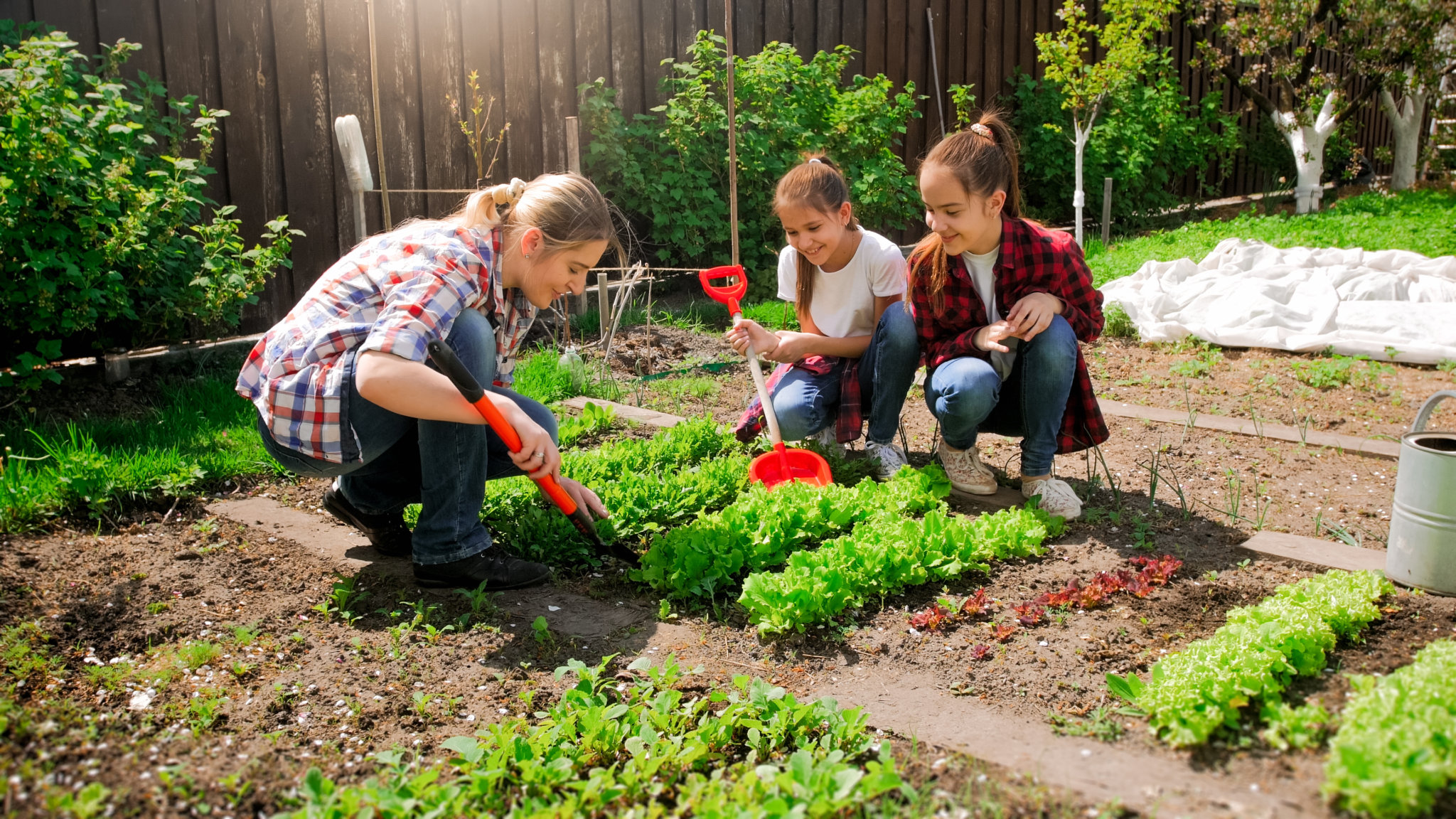Shepherd’s Hill Academy is excited to partner with Gabb Wireless to bring resources to families across the nation. Shepherd’s Hill Academy Sustainable Development Teacher, Mrs. Kelly Deal, recently shared insight with Gabb into the positive impact of Gardening and how it combats digital addiction. She also highlights tangible examples of ideas for parents to incorporate at home. Gabb Wireless works to offer a cellular network and device for children and teens free of apps, internet, and other “addictive” and dangerous technology.

As a child I vividly remember my mother telling me to “get outside!” She would say it was good for me. It did feel good being in the great outdoors even though I didn’t understand why.
In today’s digitally-saturated world, there are a myriad of things to do indoors, causing our youth to miss out of the benefits of getting outside, playing, and engaging in physical activity. Getting outside isn’t just something we should say to our kids, but something we should live!
Digital Addiction Changes a Child’s Brain
Digital addiction is often described as the condition in which an individual is no longer able to engage in typical living or function due to excessive technology usage. Normal activities are interrupted or inhibited by excessive usage, including lack of sleep, trouble concentrating, the inability to have a face-to-face conversation and more.
As kids of all ages engage in screen-based activities, the neural pathways in their brains physically adapt to a sedintentary life. Very much life a drug or other addiction, excessive digital use literally changes a child’s brain. This is especially debilitating when a child is under 25 and their brain has not yet fully developed.
Life Lessons Found in Gardening
How can something like gardening be beneficial to kids dealing with overstimulation from their digital devices? Is it educational? Absolutely! I have found through my teaching that gardening empowers kids of all ages to live a lifestyle of sustainability and helps combat digital addiction.
Gardening not only detaches kids from their screen, but also teaches children, teenagers, and adults alike many valuable life lessons. In fact, many of these lessons can be overlooked when we are constantly glued to a screen or device.
Here are just a few key lessons from the practice of gardening:
You Reap What You Sow in Your Child’s Life
When shopping for your garden you’ll want to decide what you will grow. Maybe you scan catalogs of seeds or find a display at your local store. No matter what seed packet you choose, you can be confident that it will produce that plant.
You wouldn’t purchase herbs and expect wildflowers, nor would you plant fruit and expect vegetables. What you plant, water, and care for grows into the plant it was designed to be from the beginning.
Translated that back to your child’s life and your own: if you plant positive things in your life and surround yourself with positive influences, that is what you sow. The opposite is also true. If you engage in negative behavior, the consequences are inevitable.
The Benefits of Hard Work, Teamwork, and Responsibility
Gardening is hard work! It takes time, patience, and dedication to sprout a successful garden. But through the experience, children and teens learn the benefit of hard work. Taking these values outside adds to the benefit by allowing them to get their hands dirty. They feel the grass and the dirt. The kinetic, hands-on experience is good for the body and the soul and offers extensive therapeutic value. Gardening also allows families to work together. In creating a successful garden, children learn the importance of each task, no matter how large or small.
Gardening is Therapeutic and a Natural Detox
Gardening is not only a fun and educational experience for kids, but also creates a feeling of accomplishment. Experiential learning provides therapeutic value and promotes holistic healing in each individual. It is essentially a natural detox from technology and a digital world.
As kids are outside and exposed to sunlight and natureh, it promotes healing and combats mood dysregulation by stimulating natural neurotransmitters in the brain. In fact, being outdoors has been associated with decreasing anxiety, increasing energy and creativity, boosting the immune system, and helping the body mitigate and deal with pain. Individuals are able to be assigned (or choose) tasks and jobs within the garden that help them meet and put into practice their therapeutic goals.
Last summer as I was teaching gardening at my school, a teen who naturally gravitates towards indoor activities kept requesting to pull weeds. When I asked if that was the job she really wanted to do, she replied, “I would really like to just pull weeds. It’s kind of my favorite thing to do because I get to work and just think some things out.”
Cultivating plants helps give children visual representation to cause and effect patterns of development and growth, and can be rewarding for them to see their work become fruitful and productive.
Adding a Garden to Your Home
Whether you have a green thumb or are just getting started, a garden (large or small) is a great way to add natural wellness to everyday life.
Work together as a family to create a plan your garden. Where will it be located? What will it look like? What will you grow? Determine the tasks and jobs needed for the garden to thrive and who will be responsible for what, as well as what to do if tasks need to change.
Being outside, getting hands dirty, and enjoying time as a family encourages mental health and wellness in your home. Children need the opportunity to live in an unplugged, nature-based environment and participate in outdoor activities. Explore and discover the amazing benefits of gardening as a family. I know you won’t regret it!

